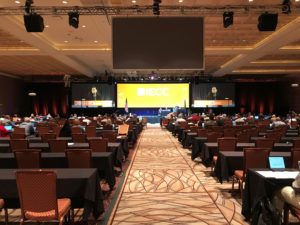Blog: 2021 Energy Code Progress Challenged: Climate and Affordability Stand to Lose Unless We Speak Up
This is the first supplement of three blog supplements. Read the full blog and other related resources.
Claimed Basis for Appeal: International Code Council (ICC) should reject thousands of online votes cast for proposals that improve efficiency because these proposed code changes were voted ‘disapproved’ at two development milestone meetings: (1) the Committee Action Hearing (CAH); and (2) the Public Comment Hearing (PCH).
Appeals from:
- Leading Builders of America, Ken Gear, CEO: Appeal Results of the Online Governmental Consensus Vote regarding Proposed Changes to the 2021 IECC (Multiple code changes)
- Leading Builders of America, Ken Gear: Request for Evidence in Support of Appeal
- NAHB Appeal of the ICC 2019 Group B Code Cycle Final Action Results (Multiple code changes)
Analysis: The rules that established voting procedures were set before this development cycle began, and even the appellants state that no rules have been violated. Disagreeing with the outcome of the voting does not justify retroactively change the rules. In addition, validation of the votes was addressed when first raised as a challenge providing no basis for re-engineering of Council Policy 28 (CP-28) and threatening the fairness of the ICC process. See below for more details on the arguments.
The voting challenge has already been decided
This issue was first raised in the form of a challenge to the voting results by:
- Thomas Zaremba, Partner at Roetzel & Andress
- Leading Builders of America
- National Association of Home Builders
- Home Builders Association of Michigan
Challenges were placed before the ICC Validation Committee, which is charged with certifying the results of the tabulation of in person votes from the PCH and online votes, as stated in Council Policy 28 – Code Development Section 10.1. The validation committee is additionally responsible for identifying potential voting irregularities, as stated under Section 10.2. The validation committee completed both tasks, and in the Report on the Code Development Process 2019 Group B Cycle published on April 8, 2020, reported the following on page 7:
“A staff review of the OGCV since its inception in 2014 has confirmed that the pattern of voting identified in the letter as an irregularity — disapproved at the CAH, disapproved at the PCH, then passed during the OGCV — has not occurred previous to this current cycle. However, this pattern of voting is not prohibited in CP 28, and this specific scenario is provided for in Section 8.1.
Section 8.1 notes that where the action is disapproval at both the CAH and PCH, a two-thirds majority is required to achieve a final action of as submitted. This is what occurred for the 20 code changes identified in the Zaremba letter.”
Most directly, the report states: “Staff found that no voting irregularities occurred during the 2019 Group B cycle.”
An attempt to change the rules
Council Policy 28 lays out the process by which votes are cast, counted, and proposals are passed under Sections 7.0 Public Comment Hearing, 8.0 Online Governmental Consensus Vote, and 10.0 Tabulation and Validation.
Again, according to the Report on the Code Development Process 2019 Group B Cycle, all of these processes were followed.
- Regarding Section 7.0: “The 2019 Group B Public Comment Hearings (PCH) were conducted in accordance with Section 7.0 of CP 28”
- Regarding Section 8.0: “Section 8.1 notes that where the action is disapproval at both the CAH and PCH, a two-thirds majority is required to achieve a final action of as submitted. This is what occurred for the 20 code changes identified”
- Regarding Section 10.0: “On March 31, 2020, by a unanimous vote, the Code Council Board of Directors certified the results of the OGCV for the 2019 Group B cycle.”
This appeal is attempting to change CP 28 and retroactively adjust the rules and, more importantly, is out of scope for the Appeals Board. Council Policy 46 governs the review and changing of other Council Policies through a committee established by the Board of Directors. Stated in section 5.2 Amendments to Existing Council Policies “Substantive amendments to existing Council Policies that are proposed to the Board of Directors shall be reviewed by the Committee.”
Preserving the ICC’s Democratic Process
The ICC governance system intentionally allows for participation of its members. If this appeal were allowed to move forward, the concern raised on the “spirit and intent” of CP-28 should be reviewed. When ICC introduced online voting in November 2013, CEO Dominic Sims said, “The ultimate goal is to provide a superior way to develop codes and increase participation in code development.” While the CAH and the PCH meetings are important to allow many perspectives to be brought up and considered, they are not representative of all ICC members. Over 2,000 ICC members, who were not at the hearings, voted for the IECC online. And while these numbers were smaller than the total number of GMVRs, they far exceeded the in-person counts at the Las Vegas hearings, where the maximum number of votes cast for any one proposal was 64. The lowest number? Three.
A primary hurdle jurisdictions face on in-person voting is the cost to send multiple staff to week-long, out-of-state meetings, such as the Public Comment Hearing in Las Vegas, to cast in-person votes on proposals. Whether GMVRs come from Detroit, Boston or Portland, travel expenses can range from $1,800 to $2,200 per person. For jurisdictions to send all eligible voters would be cost prohibitive.
Additionally, local governments must absorb the lost week or more of productivity for each employee that attends. The PCH in Las Vegas running five days of active testimony, employees who traveled were out of the office for seven full days.
The ICC was right to institute online voting to allow more members to participate and follow the will of its members to shape the code.
